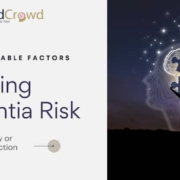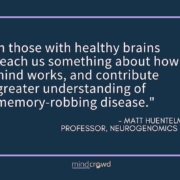Into the Mind of… Matt Huentelman
The TGen researcher explains why he’s using crowd- sourcing to better understand Alzheimer’s disease.
In this weekly opinion section of The Arizona Republic, MindCrowd creator Dr. Matt Huentelman explains the MindCrowd project, the promise of genetics, and why MindCrowd will help researchers understand brain function in healthy individuals and provide a baseline that will help show what goes wrong in Alzheimer’s disease and possibly other brain disorders.
Into the Mind of… Matt Huentelman
Has the understanding of Alzheimer’s disease progressed much in the past decade?
Absolutely! Advances in genomic sequencing, brain imaging and other technologies have significantly accelerated our knowledge of Alzheimer’s disease.
Yet, we’re still a long way from a complete understanding of the disease: the environmental and genetic risk factors, how the disease progresses and — most importantly — how it can be halted or prevented.

What is the promise of genetic research in finding causes and a cure?
Today’s technology allows us to identify many of the genetic risk factors associated with Alzheimer’s, which provides a much-improved blueprint for identifying drug development targets. The hope is that these genomics-informed targets will prove more relevant for Alzheimer’s disease therapy than current ones.
You’ve posted an online quiz as part of your research. Why go such an unscientific route?
Actually, it is scientific. Science is about applying the best tools or technologies to answer specific questions.
MindCrowd.org is a scientific Internet tool. With a target sample size of 1 million people, this will provide a broad sampling of the human population. And it’s working. We’ve already had participants from more than 100 nations and every state in the U.S.
What do you hope to learn?
My colleagues at the University of Arizona, Banner Health and I believe there is much to learn about the role of genetics in brain function of healthy individuals. That’s why we’ve targeted individuals of all ages without memory loss symptoms to participate in MindCrowd.
Understanding brain function in healthy individuals gives us a baseline that will help us show what goes wrong in Alzheimer’s disease and possibly other brain disorders.
Have other researchers tried crowdsourcing on this scale?
Researchers now realize that social networking and crowdsourcing can power specific types of research projects. In many respects, they have demonstrable benefits over traditional volunteer recruiting approaches.
What makes MindCrowd unique is the large number of participants we plan to reach, and the eventual tie to genomic testing.
We tried the test, and froze trying to remember a dozen random word pairs. Does that mean we’re on the path to Alzheimer’s?
No, not at all. The MindCrowd word test is neither a diagnostic tool for Alzheimer’s disease nor an indicator of future risk. We are testing a very specific portion of how the brain works.
We designed our first test to engage participants and get them excited about being part of what could lead to a better understanding of Alzheimer’s disease. It also shows people that science can be accessible and not everyone needs a Ph.D. to participate.
Will people learn anything about themselves if they take this test?
I think they will. Participants who complete the test see their results within seconds and there’s a feature that allows them to compare their score with others by age, gender, education level and other groupings.
I encourage readers interested in learning more to go to azalz.org, where they can register to attend the Arizona Alzheimer’s Consortium Public Conference on May 24 in Peoria.
You can make a difference.
Participate in the first online research project of its kind and help bring us closer to a cure for Alzheimer’s and other age-related brain degenerative diseases. Will you help us reach the 1 million people mark?


 MindCrowd
MindCrowd





Simply wanna admit that this is very helpful, Thanks for taking your
time to write this.
I’d like to thank you for the information you are sharing by writing this blog.